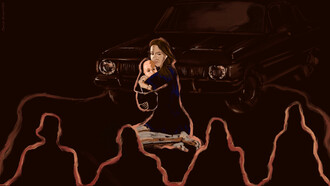All of us alive on the planet today are part of the most significant transition in centuries, whether we know it or not, whether it has touched us lightly or heavily and whether we choose to be or not. Not since the Industrial Revolution has such a total and radical social upheaval occurred.
As with most major cultural shifts, this one follows a technological innovation of which we are all aware and that is the invention of the Internet along with its ready accessibility on a handheld ubiquitous device.
This dependence on technology to spur social change has been the case perhaps since the first person to do so created the wheel. Automobiles and air travel, movies and recordings changed the lives of those who lived in those later eras; the introduction of safe birth control measures changed the lives of millions of women and the advances in medicine, clean water and vaccinations allowed generations of unborn children to survive and thrive. Yet they were minor in comparison to the current evolution/revolution.
Internet development and growth have and will continue to lead to perhaps overwhelming changes for our current population. Most of us are aware of some of these changes even if we haven’t identified the cause because we experience them every day, not only culturally, but very personally. We experience them in our day to day interactions, in our work situations, in our friendships, visiting with each other, etc. We also experience the tools of the internet more personally as convenience and relief, stress, anxiety, and pressure and perhaps even loneliness.
Younger people may not even be aware of these personal effects as they have no basis for comparison if they were born after the introduction of Google and online social networks. They have never not been online. Those of us who have had to make the transition certainly experience it more consciously.
I know I do. During this year of Zoom meetings for business and Zoom meetings with friends and family, I have been both comforted and overwhelmed, experienced intimacy and loneliness. For better or for worse, I have conducted psychotherapy sessions in ways that I had not thought possible.
This current era has presented us with a physical and psychological revolution of enormous magnitude and even more so when combined with the leftover effects of the Industrial Revolution. Living on the cusp of multiple endings and beginnings inordinately stresses our bodies, minds and spirits, whether we are aware of it or not.
If this enormous change is not enough, we contemporary humans face yet another huge challenge from the effects of climate change, among which may be a soon to be uninhabitable planet, a possible scarcity of clean air and water, altered weather patterns and areas of uninhabitability by humans.
These changes are already releasing novel viruses that have been frozen and inactive for eons. The Corona is only the first to travel the planet with ease. From the perspective of these world travelers, we are mere transportation. Water is about to be traded on the Stock Exchange and we seem to be preparing for increasingly necessary human journeys to other planets, Mars for a start.
As human bodies become less central to us and to work, to travel and to the welfare of the planet, they also become less important in a variety of other ways. They are not needed as much for labor and, when the labor is not physical, not necessarily needed to be transported. Much work, we have discovered courtesy of Covid, can now be done virtually from any wired location. So can learning. So can physical and psychological therapies. The results of these changes are not identical, but they work well enough to become our future.
Even human rights are affected. At the very same time as we are moving toward equality for women, we are moving toward a non-biological definition of women and men and the removal of many hard earned sex-based rights. At the same time as we are considering reparations and equity for African-Americans, we are seeing the birth of a White supremacist party of not insignificant numbers.
Sexuality and intimacy are shifting shape as well. Pornography is a click away, as is the practice of sexting. Adolescence is no longer a time of innocent learning if it ever was, but a time of multiple choices concerning sexual practices and sexual identities. The ready intensity of all this arousing material is wreaking havoc with the sexual practices of their users, largely male, who are left seeking more and more intensity in actual practice.
Finally, there is a tidal wave sweeping men into the category of women and women into the category of men. Biological sex is demoted as secondary, if that, to desire and personal identity. From childhood through mature adulthood, sex can be changed by the flourishing (5 billion dollars a year) medical-industrial complex. In many cases, a man need only put on a dress and declare himself female. This is what it’s coming to, as the individual dissociates from their own body.
Science is both denied and centered, technology superseding theory, practice more central than thought. Perhaps that is the tenor of the current era-seeking more and more intensity with identities both more malleable and more fragmented. And always pressure not to think too much, to participate, to belong even when there is nothing left to belong to.
Psychologically these changes induce enormous stress on most of the population. We have until now been fully embodied individuals, defined by sex, skin color and class. As we are caught up in this transcendent force and reoriented to the physical, to the ways we work, play and love, we are faced with the consequences of this paradigm shift, as well as the consequences of the consequences.
Can we adapt to these changes and, if so, who are we when this adaptation is complete? Are we moving toward a humanistic culmination of rights or a disembodied dystopia? The future is now.















